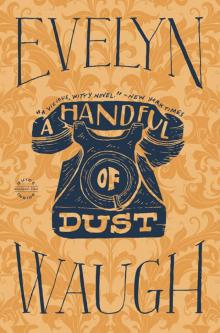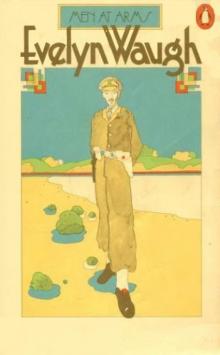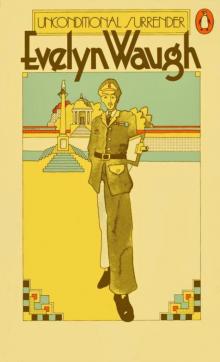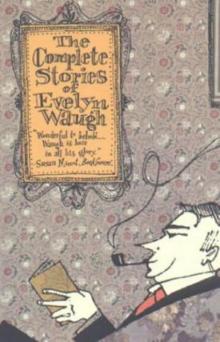- Home
- Evelyn Waugh
Helena Page 2
Helena Read online
Page 2
“Would you say, sir, that Tetricus has a considerable following among—?”
“Just a minute young man, I haven’t finished what I was saying.
“I’ve been a regimental soldier all my life until they retired me here. I’ve never gone in for politics or for intelligence or for special missions. You’ve asked me a lot of questions in the last two days and I haven’t asked you one. I haven’t asked you who you are or what you want. Your letters say you are a member of Tetricus’s staff; that’s quite good enough for me. As I’ve told you I’ve never gone in for secret service work and it’s too late now, but I’m not quite a fool yet. Allow me to give a little advice. Next time you want to pass yourself off as a member of Tetricus’s staff, don’t boast about making trips to Persia, and if you want me to think you come from Cologne don’t pick your personal guard from a legion that has served on the Danube for the last fifteen years.
“And now, if you will excuse an old man’s infirmity, I propose to sleep.”
*
“ ‘And Aphrodite caught up Paris in a cloud of darkness and bore him to his own fragrant and high-vaulted chamber and herself sought Helen where she stood among her women above the Scaean Gate. She plucked her perfumed gown and said: “Come, Paris is waiting on his carved bed, radiant, delicately clad as though he were resting from the dance.” And Helen, daughter of Zeus, slipped away from her attendant women and stood in her shining veil in Paris’s room. Laughter-loving Venus set a chair for her by the bed, and Helen said: “Would you had fallen in battle.” But Paris answered: “We too have Immortal allies. Come. My love is sweet and hot as the day I took ship with you from Sparta, as the night on sea-girt Kranae where I first knew you. Come.” So they lay together on the fretted bed while beyond the walls Menelaus roamed like a wild beast seeking for Paris and finding him not in all the watching host. Neither Greek nor Trojan would hide Paris for they hated him as they hated black Death itself and while he lay heedless, King Agamemnon proclaimed Menelaus the victor and fair Helen forfeit.’ ”
“What a lark!” said Princess Helena. “What a sell! Can’t you just see Menelaus ramping and raging about and being smacked on the back by everyone and Agamemnon pompously declaring him the winner? And there was Helen tucked up with Paris all the time. Oh, what sucks!”
“It is an incident quite inconsistent with the heroic virtues,” said Marcias. “For that reason the great Longinus considers it the interpolation of a later hand.”
“Ah,” said Helena, “the Great Longinus.”
He was a figure half of fun to her, this stupendous pundit, half of awe; her second heroic myth. The first was her nurse’s father, a sapper-sergeant slain by the Picts; she never tired, as a child, of stories of his valor and integrity and when she was translated from nursery to schoolroom, Longinus inappropriately took a place beside him; Marcias paid him more than filial homage; his name occurred hourly, at every lesson. Omniscient, polymath, throned in the remote splendors of Palmyra, Longinus had become invested in her mind with the legends of her race, identified with those white-robed men of the sickle and the mistletoe whose garbled lore was still whispered in the kitchen quarters. These dissimilar paragons were the twin deities of her adolescence; she had a homely, humorous intimacy with them, but also awe.
*
The snores of the District Commander still rang through the dome while Constantius neatly dressed himself and went alone through the rain and mire to the City gates.
“There he goes,” said Helena, “the man of mystery, the beauty.”
When he reached his quarters he called the commander of his guard.
“Corporal-major, the men are to take down their regimental numerals immediately.”
“Very good, sir.”
“And, corporal-major, impress on them the need for absolute security. If anyone asks any questions, they’re from the Rhine.”
“They’ve been told, sir.”
“Well, tell them again. If I hear anyone’s been talking, I’ll confine the lot to barracks.”
Then Constantius called his valet and his hair-dresser and set about such adornments for dinner as were possible to a field-officer traveling light, on confidential business.
*
The ladies did not dine with the gentlemen but they dined extremely well; their cozier parlor lay between hall and kitchen and Helena’s aunt, who ruled the household, made her own choice of the dishes before they left the charcoal and conducted them under her own eyes, succulent and piping hot, less elaborately garnished than those which appeared before the King, but with all their pure flavors unimpaired. Moreover, instead of lolling in manly style among the cushions and being fed by slaves, the ladies of the household squatted square to their victuals at a low table, rolled back their sleeves and got their hands well into the pot. The plain but abundant fare comprised oysters stewed with saffron, boiled crabs, soles fried in butter, sucking-pig seethed in milk, roast capons, tidbits of lamb spitted between slices of onion, a simple, sweet confection of honey and eggs and cream, and a deep Samian pitcher of home-brewed mead; it would not have done in Italy or Egypt but it was well-suited to the British ladies’ taste and circumstances.
“What a spread!” said Princess Helena, when she had guzzled. “What a blow-out!”
The ladies were putting themselves in order for the concert. Helena’s hair which at her lesson had hung in thick russet plaits was now maturely dressed and bedizened; she wore a robe of embroidered silk which had come to her by dromedary and ship and pack mule and porter from distant China; her narrow slippers shone with stones and gold thread and when she had washed her hands and white forearms—“Helen of the white arms, fair among women,” she thought as she dabbled in the steaming, limewater—she planted all sixteen various rings that had been the youngest sister’s share of her mother’s jewel-chest, firmly on her strong young fingers.
“You look perfectly charming, child,” said her aunt, adjusting the fillet on Helena’s brow. “We won’t go in quite yet. The gentlemen have just gone to be sick.”
Presently the ladies of the royal house made their entry. “Helen, fair among women, daughter of aegis-bearing Zeus,” thought Helena, as, last but tallest of the line, behind her aunt, her father’s three mistresses, her three married and two unmarried sisters, Helena saluted her father. He waved to them generally and genially from his couch and they took their places at the side of the room on their ten stiff chairs.
Then the orchestra struck up, three strings and a wayward pipe, and the singers—first one, then another, at haphazard intervals it seemed; finally all eight of the patriarchal basses—joined their full lungs in the opening dirge.
“I expect you are used to this kind of thing,” said the District Commander privately to Constantius.
“To nothing quite like this.”
“We have it whenever Coel gives a party. It lasts for hours.”
The first direful sounds raised the King, who had already shown abundant pleasure in his entertainment, to evident transports. “My favorite piece,” he explained; “the lament for my ancestors. We usually start with it. Like all true art it has the merit of prodigious length. Of course since it is in our native tongue, some of it may be lost on you. I will tell you when anything particularly fine is said. At the moment they are treating of the foundation of my family in remote, almost legendary, times by the irregular alliance of the river Scamander with the nymph Idaea. Listen.”
High and thin and heartless sang the fiddles and the chanter; deep and turgid and lachrymose sang the bearded choristers. Lax and supine sprawled the soldiers; rigid and erect sat the royal women. Softly the page stepped from couch to couch with the mead-bowl; heavily the District Commander stumbled once more to the vomitorium.
Uncouth, hypnotic, the voices filled the hall from coffered roof to mosaic pavement and carried far into the night their tale of death.
“Brutus, great-grandson of Aeneas, has now reached Britain,” said Coel at length; “we have al
most, you might say, reached modern times. He is the real father of our race. He found the whole island quite empty, you know, except for a few old giants. After Brutus the story becomes much more circumstantial.”
None of King Coel’s family, it appeared, had died naturally; few even plausibly. One took doctored wine at the hands of his step-daughter and ran horribly amok in the forest, naked, tearing up young trees and frightening the wolves and bears. And his was by no means the most alarming case. All the bereavements of that ancient and tuneless family—classic myth, Celtic fairy tale and stark history—mingled and swelled inharmoniously, among the cooking smells and lamp smells and the heavy smell of mead.
Constantius was a man of temperate habits; he had seen more than one officer gormandize himself out of fine prospects in the days of the Divine Gallienus; but he had drunk deep that night, so that the sharp pain of the entertainment was dulled and he lay bemused, borne out of himself by the fumes of liquor, so that he looked down on all his talents, neatly displayed like cut gems on the engraver’s tray, and saw himself almost as he was. There was little self-love in Constantius; others, not he, in the last two centuries had been consumed by that master-passion; others, now the peers and playmates of the Gods, had died of that sickness. Constantius in his own eyes fell short of perfection. His talents comprised all that was needed—no more; a representative collection, not unique, but adequate; he would make do. His need was simple; not today, not tomorrow, but soon, sometime before he grew too old to make proper use of it, Constantius wanted the World.
“They are singing of the flagellation of Boadicea,” said Coel; “rather a delicate subject to us Romans, but very dear to my simple people.”
The recital was scarcely less familiar to Helena than to her father; she withdrew from the catalogue of mortality and, eupeptically, indulged a fantasy she had cherished since childhood. Perhaps each of the women had some such secret, interior pastime, so still they sat on their ten severe thrones. Helena was playing horses, a game which began with her first pony; a breathless, wordless steeplechase across impassable super-equine obstacles, splendidly leapt, and endless stretches of resilient sward. Helena had galloped thus in solitude hours without number, but of late years, as her womanhood broke bud, a keener excitement infused the game. Two played it now. There was the will of the rider that spoke down the length of the rein, from the gloved hand to the warm and tender tongue under the bit; articulate, coaxing, commanding, now barely sensible, light as an eyelid, now steel-hard and compelling; that spoke in the stab of the spur and sudden double smart of the whip. And there was the will of the animal to shrink and start, to toss aside the restraint of bridle and saddle and the firm legs across her, to shake the confident equipoise, awake him to the intense life and the will to combat under him; leaving him nothing of what he took for granted, draw more from him, until he put the whole of himself into the tussle. Then at the height of the play, in sweat and blood-flecked foam, came the sweet moment of surrender, the fusion, and the two were off together, single, full-stretch over the resounding earth, as they had raced in childhood, with none but the wind to oppose them. She took some handling, the chestnut.
Thus Helena galloped while through the hypocaustic air the death-song of her ancestors rumbled and wailed.
“They are singing of Cymbeline,” said the King.
Presently the hand on the rein steadied her, pressed her gently back into a walk, then patted her neck and she shook in answer the silver ornaments of her harness. They strolled together, hand-in-hand, as it were, like a courting couple along the water-side, until a slight shift of weight, a pressure from the leg, a gathering up of attention in the thrilling touch on the lip, set her once more stepping briskly out in the glades of her keen, young mind.
The dirge ended and the singers’ throats now gurgled with mead; the piper shook out the spittle and the fiddlers tinkered with their strings. The King’s applause momentarily awoke the company from their several reveries. Momentarily only; there was an interval of pledging and quaffing; then the music began again.
“This is a very modern song,” said Coel; “it was written by the chief bard in my grandfather’s day to commemorate the annihilation of the IX Legion”; and, deep in the toga, which contrary to metropolitan fashion he always wore at table, the old King rumbled with amusement.
Trotting through the limpid upper-air of her thoughts, stepping high and delicately, nibbling the bit, tossing the buckles and sparkling bosses of her bridle, making the reins ring like a harp-string with the note of assent and exultation, tenderly, sweetly displaying before the world the chivalry of her rider; thus went Helena.
And Constantius also rode; rode in triumph; not in his chariot amid the sweat and garlic-reek of the City, not behind yoked sovereigns and exotic animals, the almoners and augurs and tumblers and ceremonial troops, not in the pantomime of official triumph; but at the head of battle-worn, victorious legions, at the heart of power, at the entry into possession; he rode between crowds who were part sullen, part timorous, part flushed with gratitude for their immediate salvation, all scanning him as he passed for a sign of what was coming to them. That was Constantius’s triumph as he jogged along in his service uniform into a conquered and anxious world.
And, as he lay, he looked across the hall to the row of women; scarcely observing them, his eyes passed from one rapt face to another, until, in the lowest place but highest by a hand’s breadth, Helena raised hers to meet them. They gazed at one another, unknowing, separate, then running together like drops of condensed steam on the ewer, pausing, bulging one against the other, until, suddenly, they were one and ran down in a single minute cascade. Helena trotted on and Constantius bestrode her in triumph.
Constantius had done something unprecedented and unpremeditated, something for which his talents were ill suited; he had fallen in love.
Two
Fair Helen Forfeit
On the morning after the banquet Constantius woke early and ill—it was thus that his liquor always took him even in the vinelands—and like the well-trained officer he was, he sought as soon as might be, to shift the burden of malaise on his subordinates. For weeks now he had left early stables to his corporal-major; gray, queasy mornings such as this were ordained for discipline.
As he expected, everything was behind-hand; he saw it in the corporal-major’s eye as he saluted; he saw it in the men as they stood to attention; he saw it in the half-groomed horses and the disordered straw. What was more, there was a girl in the stables. He could see her back through the door of the harness-room, a red-headed girl wearing, surprisingly, a bridle. She turned towards him and removing the bit from her mouth, smiled.
“You are late,” said Helena. “I hope you didn’t mind my having a look at your bridle; the old boy in charge thought you might, but I said it would be all right. He doesn’t know the first thing about horses, you know. He thinks these are Gallic.”
“That’s right, Miss,” said the corporal-major, glad at last to be on safe ground. “We’re all from Gaul, troop and horses. It’s in orders.”
“Bet you they aren’t. I’d know them anywhere. They come from Allectus’s stud in the South. He sent me one once; they’re quite special, you know. Aren’t they?” she asked Constantius.
“You’re quite right,” he said, “we remounted at Silchester. What are you doing here?”
“Oh I always go round and look at any new horses that come in.”
“And try on the harness?”
“If I feel like it. I say, you do look ill.”
“All right, corporal-major, carry on.”
“Quite green.”
“We met last night, in a way.”
“Yes.”
“What do you do besides hang about the stables?”
“Oh I’m still being educated. I’m the King’s daughter you know and we Britons think a lot of education. What’s your name?”
“Constantius. What’s yours?”
“Helena. Green-f
aced Constantius.”
“Helen the ostler.”
And so these two names, “Chlorus” and “Stabularia,” lightly blown, drifted away into the dawn and settled at last among the pages of history.
*
Constantius had allowed no time for courtship in his itinerary. The whole British visit was supererogatory, something subsidiary to his main mission; something which, if it ever came out, would want explaining. It had seemed easy, with his other business speedily concluded and a month in hand, to slip across the Channel, to see for himself this little-frequented dependency, to form his own opinions, to add to the knowledge he was patiently building up of the vast structure of imperial government, to add one or two more names to the men of consequence with whom he was on personal terms. But he had not reckoned on falling in love.
However, the thing had happened and must be settled expeditiously. He presented his suit to Coel.
“It’s all very well,” said the King crossly, “but I don’t know anything about you.”
He had tried Constantius drunk and sober and he did not like him; he found him both dull and sly; dull when drunk and sly when sober. He was not at all Coel’s idea of a gentleman, and the District Commander whom he had consulted as soon as this question of Helena’s marriage arose, had said exactly what Coel was saying now. “I don’t know anything about the fellow.”
Constantius answered: “There’s very little to know… as yet.”
“Your family?”
“On that score you may rest completely satisfied.”

 A Handful of Dust
A Handful of Dust Complete Stories of Eveyln
Complete Stories of Eveyln Brideshead Revisited
Brideshead Revisited Men at Arms
Men at Arms Black Mischief
Black Mischief When the Going Was Good
When the Going Was Good Officers and Gentlemen
Officers and Gentlemen Helena
Helena Unconditional Surrender
Unconditional Surrender The Ordeal of Gilbert Pinfold
The Ordeal of Gilbert Pinfold The Complete Stories Of Evelyn Waugh
The Complete Stories Of Evelyn Waugh